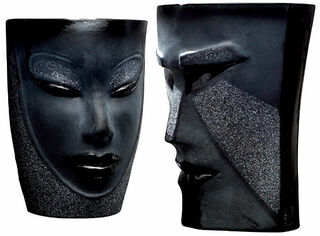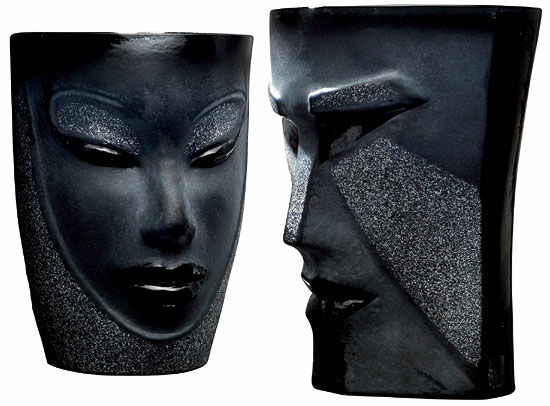Set of 2 water glasses "Kubik and Elektra", black version
Set of 2 water glasses "Kubik and Elektra", black version
Quick info
crystal glass black | sandblasted | polished | "Kubik" size: 8.5 x 12.5 x 8.5 cm (w/h/d) | "Elektra" size: 8.5 x 11.5 x 8.5 cm (w/h/d)
Detailed description
Set of 2 water glasses "Kubik and Elektra", black version
The artist Mats Jonasson first moulds each piece in plaster. Next, he creates a hollow iron mould into which he pours high-quality crystal glass. Finally, he sandblasts and polishes the blank in an elaborate process. TThe Maleras Glassworks is testimony to Jonasson's commitment to keeping design and production in the Swedish glassblowing village permanently - despite many counter-offers. Today, his glass art is world-famous among collectors.
Set of two glasses "Kubik and Elektra". Version in black.
Size "Kubik": 8.5 x 12.5 x 8.5 cm (w/h/d). Capacity 37 cl.
Size "Elektra": 8.5 x 11.5 x 8.5 cm (w/h/d). Capacity 33 cl.
Customer reviews
Sehr freundliche und unkomplizierte Mitarbeiter !
Ein TOP Artikel. Bin begeistert und überlege, ob ich ihn nicht selbst behalten soll. Ist ein Weihnachtsgeschenk für meine Enkelin. 😊👍👍👍👍👍😊
Ich habe lange Zeit nach einer Möglichkeit gesucht, meine Gästen Mineralwasser angemessen servieren zu können.
Die Ästhetik und Haptik begeistern meine Gäste und mich immer wieder.
SUPER ZUFRIEDEN: Zum Trinken zu schade.
Ware und Verpackung einwandfrei. Versand per GLS war etwas problematisch.
In Natura noch schöner!

About Mats Jonasson
Mats Jonasson's world of glass
In modern glass art, tradition, craftsmanship and technology are closely linked. This also applies to one of the most famous masters of this profession, Mats Jonasson, whose works are created in Maleras, Sweden. The Maleras Glasbruk is the testimony to Jonasson's commitment to keeping design and production in the Swedish glassblowing village permanently, despite many counter-offers. His glass art is now world-famous among collectors.
He already proved his artistic talent at the beginning of his professional career in 1959. For many years, he had the opportunity to work with Sweden's most famous glass artists and during this time he developed his special style, which he constantly perfected.
The process of creating a completed glass object is long: it starts with a sketch and leads to a plaster mould and then to an iron mould, which only after extensive post-processing finally results in the casting of the special glass. The resulting blank is sandblasted and polished. Often there is even a second process step where artisans engrave the glass object, which becomes a unique work of art thanks to its extraordinary design.


